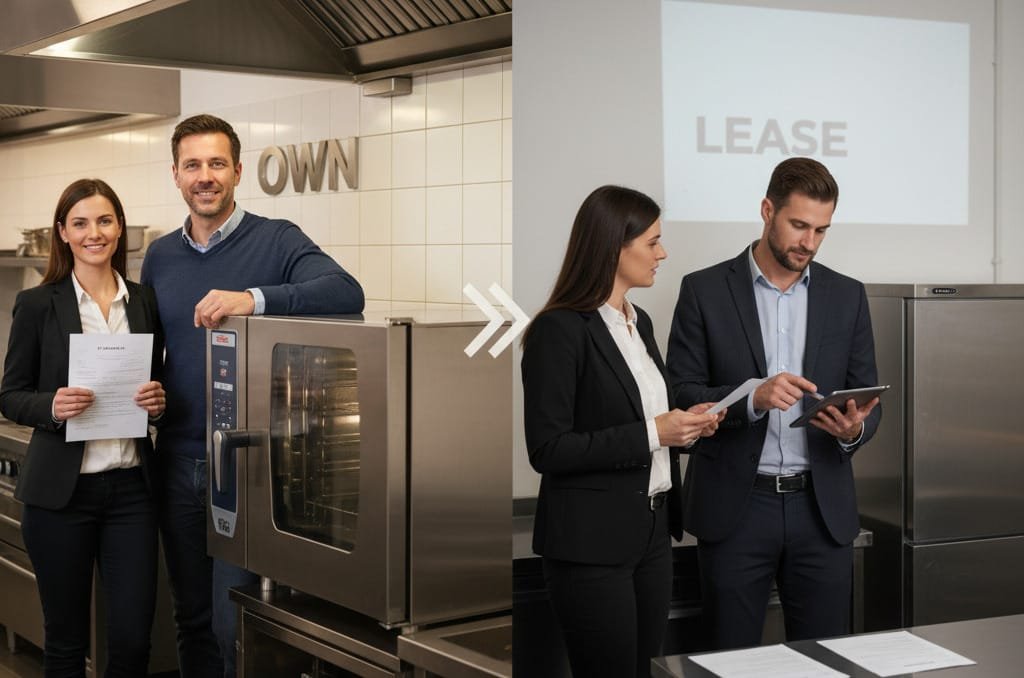Getting Started: Every Startup's Big Problem
Starting a new business is a rush! But then reality hits: you need expensive gear. Think big machines, fast computers, or a new delivery truck. Buying this stuff outright means you have to drain your bank account right away. That huge down payment on essential equipment can kill your cash flow before you even open the doors. It’s a tough spot: spend big to grow, or save cash to survive?
Luckily, there’s a smart way out of this trap. For any company watching its budget, getting zero down equipment loans is a perfect solution. This kind of financing lets you get the necessary equipment now. You can start making money right away without spending your key savings. You get to keep your cash for things like payroll, marketing, and inventory, setting your startup up for solid, long-term success.
What Are Zero Down Equipment Loans? (The Simple Explanation)
So, what are these zero down equipment loans? It’s easy: the lender gives you 100% of the money needed to buy the equipment. You don’t have to put any cash down. This is huge! Think about it—most regular loans make you pay 10% or even 25% upfront. For a startup, that’s a massive amount of money saved.
What makes this possible is that the equipment itself acts as security, or collateral, for the loan. The lender knows they can take the machine back if you don’t pay. Because they have this backup plan, they are much more comfortable offering you better deals, like the zero-down option. You’re using the value of the equipment to get the funding, which makes getting the gear you need fast and simple.
Cash is King: Why Saving Your Money Matters
For a new business, your working capital is everything. That’s the money you have available to pay the bills every day. It’s your safety net. It’s the engine that keeps things running when sales are slow. Spending $30,000 on a down payment, for example, means $30,000 you can’t use to hire a much-needed employee or to run an ad campaign that could bring in your first big clients.
That’s why protecting this cash is super important for staying alive in the early days. Zero-down financing makes sure that cash stays in your bank account, ready for anything. It’s there to handle unexpected costs or to jump on new opportunities. If you’re ever planning to do asset-heavy work like flipping houses, knowing how to leverage cash is even more critical. You should take a look at the guide on Financing Your First Flip: Using a Business Line of Credit for Real Estate Investment Ventures to see how others manage big investments.
How Does Zero-Down Financing Actually Work?
The process for a zero-down equipment loan is pretty straightforward. First, you find the equipment you need and get the price from the seller. Next, you show that price to your chosen lender. They check out your business finances and the actual value of the machine. If approved, the lender pays the full cost of the equipment—you pay nothing upfront.
Then, the lender officially puts a claim, called a lien, on the equipment. This means they legally own a piece of it until you pay off the debt. The equipment acts as the guarantee for the loan. You make fixed monthly payments over a set time, which includes the loan amount plus interest. Once that final payment clears, the lien is removed, and your startup officially owns the asset, all without an initial cash hit.
What Lenders Look For: Getting Your Application Ready

When you apply for equipment financing for startups, lenders look at more than just the value of the machine. They mainly want to know if your company can make enough money to cover the monthly payments. Unlike big banks that demand years of history, equipment lenders are often more flexible. They know your business is new.
So, you need to show you have good personal credit and a solid plan. Lenders will usually ask for a detailed business plan, a guess at your future revenue (projections), and personal finance details from the owners. If you already have contracts or big orders lined up, that’s great! It proves the new equipment will start generating income immediately, which makes the lender much more comfortable saying yes.
Current Market: Rates and Terms You Should Know
The small business lending world is always changing. You need to know what’s going on before you commit to a long-term loan. Interest rates and repayment terms can change based on the economy and how much competition there is among lenders. A great deal last year might be just okay today, so you need to do your homework.
It’s smart to pay close attention to the payment schedule and any fees for paying the loan off early. Some lenders might hook you with a low starting rate but raise it later, or they might charge a huge fine if you try to clear the debt early. To get a handle on what’s current in the market and make sure you’re getting a fair deal, you should read Small Business Lending in 2024: The Top 5 Trends in Repayment Terms and Interest Rates. Knowing the current trends helps you negotiate better.
What Kind of Equipment Can You Finance?
Almost any piece of business equipment that has a good resale value and lasts a few years can qualify for zero-down financing. The main rule is that the equipment must hold enough value to act as good collateral for the loan term. This means financing a tractor is usually easier than financing a piece of custom software, because the tractor has clear physical value.
For example, a printing company can finance a new press, and a dentist can get a state-of-the-art X-ray machine. The asset has to be something that helps you earn money and keeps its value. Here is a simple list of things that usually qualify for this kind of funding:
Business Type | Equipment Examples | Expected Lifespan (Years) |
Construction | Excavators, Dump Trucks | 8-15 |
Manufacturing | CNC Machines, Robots | 10-20 |
Restaurants | Commercial Ovens, Refrigerators | 5-10 |
Office/Tech | Large Server Racks, High-Volume Copiers | 3-7 |
Picking the Right Partner: How to Find the Best Lender
Your success with zero-down financing really comes down to the lender you choose. Equipment finance companies are not all the same, and their focus area matters a lot. Some lenders, for example, only work with heavy machinery, while others specialize in medical equipment. You want a lender who knows your industry well.
So, you must check out any potential partner carefully. Look past the interest rate. Check their customer service, how fast they approve loans, and if they have a reputation for being honest. A good lender makes the process smooth, but a bad one can trap you with hidden fees and lots of paperwork. To make sure you pick the absolute best partner with the right rates and terms, you should use this guide: Essential Guide to Commercial Equipment Lenders: Finding the Best Rates and Terms.
Your Application Plan: Simple Steps for Fast Approval
Getting your application organized and complete is the single best thing you can do for quick approval for equipment financing for startups. Lenders love it when things are clear and easy to read. A messy or incomplete application will slow down the whole process, delaying the equipment you need to start making money. Start by knowing exactly what you need and getting an official, current price quote for it.
Next, get all your financial papers together ahead of time. This includes your business plan, recent business bank statements (if you have them), your personal tax returns, and any documents that show your company is legally registered. Sending a clean, well-put-together application tells the lender you are professional and reliable. This often means they make a decision faster and give you a better loan offer. Even though the equipment is the security, they still need to know your business can handle the monthly payments.
Owning vs. Renting: Loan vs. Lease

Zero-down loans and leases both let you get equipment without paying cash upfront, but they are very different. A zero-down loan is a path to ownership. You borrow the money, pay it back, and the equipment is yours forever. The goal is to build equity—or value—in that asset for your company.
A lease, on the other hand, is basically a long-term rental. When the term ends, you usually have three choices: buy the equipment for a final price, start a new lease, or give it back. Leasing is better for tech that gets old quickly, like computers, where you just want the latest version. The right choice depends on whether you value ownership or just want to use the latest gear.
Item | Zero-Down Equipment Loan | Equipment Lease |
Cash Upfront | None (Usually) | None (Often) |
Who Owns It? | You do, after the last payment | The finance company (Lessor) |
What’s the Goal? | To own a long-term asset | To use the equipment temporarily |
Best For | Big, expensive machines that last (e.g., forklift) | Tech that needs frequent upgrades (e.g., software) |
Another Option: Using a Line of Credit
While zero down equipment loans are great for buying big, specific items, your startup might have other cash needs that pop up often. Maybe you need to cover payroll before a client’s check clears, or you need a little cushion for a sudden jump in supply costs. That’s where a Business Line of Credit (BLOC) is a powerful tool.
A BLOC is a pool of money you can take from, pay back, and borrow again, just like a credit card for your business. It’s perfect for filling in small gaps in your cash flow—not for buying major equipment. If you want to see how this flexible tool can work alongside your equipment financing and give you the money needed for daily operations, you should read Launching with Leverage: The Fastest Way to Get a Business Line of Credit for a Startup.
Watch Out for These Common Traps
Even with zero-down financing, you need to be careful. A huge mistake startups make is forgetting to budget for costs outside of the loan payment. They often forget about things like required equipment insurance, ongoing maintenance, and the taxes related to owning the new asset. These extra costs can quickly make your monthly bill much bigger than you planned.
Also, always read the fine print about what happens if you can’t make payments (default) and how the lender can take the equipment back (repossession). Understand exactly what breaks the loan agreement and what the lender’s steps will be. While no one plans to fail, a smart business owner prepares for every possibility. Knowing the risks and the total cost of ownership will protect you from bad surprises.
Making Money: Get a Great Return on Your Investment
Buying equipment isn’t just an expense; it’s an investment meant to make you money. The most successful startups make sure the money they pay on the loan each month is much less than the money the equipment brings in. This is the simple rule for good financial decisions: the machine should pay for itself, and make a profit, long before the loan is done.
So, focus on using that equipment constantly! An expensive piece of machinery sitting around idle is actually losing you money. Create strong schedules and sales plans to ensure the equipment is working productively all the time. This focused management takes the zero-down advantage and turns it into a maximized profit machine, helping your company grow fast.
Final Word and Quick Answers
Zero-down equipment financing is one of the best moves a startup can make today. It lets you use future money to get the gear you need now so you can compete. You do this without spending the key cash that protects your day-to-day business. By learning the rules, choosing the right lender, and focusing on making that equipment work hard, you set your startup on the fast path to major success.
Quick FAQs
Q: Is zero-down financing available for every piece of equipment?
A: Only for equipment that holds its value and can be used as strong collateral.
Q: Does my personal credit score matter for a startup loan?
A: Yes, it matters a lot since your business doesn’t have a long financial history yet.
Q: Can I pay off a zero-down loan early?
A: Usually, yes, but check for prepayment penalties in the loan agreement first.
Q: How fast can I get the money?
A: It depends on the lender, but some specialized lenders can approve and fund in as little as 24-48 hours.
Q: Is the interest tax-deductible?
A: The interest you pay on business loans is generally tax-deductible, but you should always confirm with your accountant.

